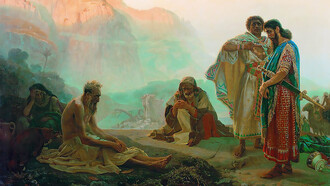Jorge Luis Borges, the great Argentine writer, had a unique ability to create new worlds in his writing. Roberto Alifano, his personal secretary and his long-time friend, told me, "When a writer as Borges passes through literature, everything is changed. A mysterious transformation, difficult to explain, takes place without us realizing it. But language is changed."
Borges changed language, but also people. One of those changed by meeting Borges is an old friend of mine, who is a psychiatrist. During a trip to Argentina, she told me about the time she had met him. "I had gone to a lecture by Borges at a cultural centre in Buenos Aires. I was a 14-year-old student planning to study literature at the university and become a writer, and Borges was a hero to me."
"I was enraptured by Borges strong personality. However, there was a big discrepancy between his physical appearance and the quality of his speech. I saw him as an old man who looked very tired, but the magic of his words transported me to another world, the world of the imagination. After the lecture, I decided I wouldn't study literature since I would never be able to write like him. I can truly say that although I saw Borges only that one time, he dramatically changed my life."
Borges' sense of humour
In reading Borges, one may think he was a very serious person; he was actually a man who loved jokes and always had unexpected responses to everyday events. Mario Rojman, a friend of mine in Buenos Aires, told me that Borges visited Peru when he was an attaché at the Argentine Embassy. Because he loves poetry, both he and Borges would have fun reciting some of the writer's poems aloud, each one a line at a time. During that visit, the King and Queen of Spain decided to visit Peru. When Rojman told Borges the news, he said, with a mischievous smile, "I hope they won't bother us..."
His sense of irony never left him. In her book Seven Voices, Rita Guibert says that after Borges published his first book called Fervor de Buenos Aires (Fervor of Buenos Aires), he took 50 copies of the book and gave them to Alfredo Bianchi, editor of the magazine Nosotros. Bianchi looked at him in disbelief and asked Borges, "Do you want me to sell this book?" Borges answered, "No, I am not mad. I want you to slip a copy into the pocket of every overcoat that passes through your office."
Alifano told me that once, they headed to a lecture hall for a discussion about Leopoldo Lugones, one of Argentina's best writers. Borges told Alifano and a lady friend that he had to go to the bathroom because he wanted to shake hands with "Monsignor". The lady who had joined the conversation didn't realize Borges' ironic remark. When Borges returned from the bathroom, she reproached him, "Georgie, you don't shake hands with a Msgr. When you meet him, you have to kiss his ring."
On another occasion, an Italian journalist tried to embarrass him during an interview in Rome by asking Borges, "Do you still have cannibals in your country?" Borges remained unmoved and replied, "No, we don't. We ate them all..." The Argentine writer Abelardo Castillo recounted that on another occasion, he asked Borges what he thought of Sartre. Borges replied, smiling: "Well, I don't usually think about Sartre."
Talking to his translator, Norman Thomas di Giovanni, about his secretary Borges said, "…I have a very efficient secretary –efficient and a bit strange. For example, if instead of saying "I am," let's suppose I made the mistake of saying "I is." She would write that down. And my friend di Giovanni can testify to the fact that in reading manuscripts of mine, he often and quite suddenly comes upon the word "period" or "semicolon." But I feel quite safe with her and can't make a fool of myself. She is a very nice woman and is very fond of me, which makes things easier."
In an interview with The Paris Review, Vargas Llosa, recipient of the 2010 Nobel Prize in Literature, says that he met Borges in different parts of the world. Once, when Borges was in Lima, Vargas Llosa gave a dinner for him. At the end, Vargas Llosa says, "…he asked me to take him to the toilet. While peeing, he suddenly said, 'The Catholics, do you think they are serious? Probably not,'" he answered himself, leaving Vargas Llosa totally puzzled.
Ezequiel de Olaso, an Argentine philosopher and essayist, wrote that he had once suggested that Borges meet with a group of young poets. Some among them wept quietly as Borges was reading. After this, Borges refused to repeat the experience and told Ezequiel de Olaso, "Look, I'm old, I'm blind, I'm a poet, and I am Latin. If they hadn't cried, they would have behaved like a bunch of scoundrels."
Politically incorrect Borges
Borges never hid his disdain for politics. When he was a young reporter, a Parisian Radio sent Mario Vargas Llosa to interview him. Vargas Llosa took the opportunity to ask Borges what was politics for him. "It's one of the ways of tedium," said Borges, a statement that he would later regret.
Borges' peculiar sense of humour led him to make remarks that, intended in jest, today would be considered politically incorrect. On his trip to Patagonia, which resulted in his book "The Old Patagonian Express," Paul Theroux stopped in Buenos Aires to see Borges. Talking about the U.S. civil war he told Theroux, "But people respect soldiers. That's why no one really thinks much of the Americans. If America were a military power instead of a commercial empire, people would look up to it. Who respects businessmen? No one. People look at America, and all they see are travelling salesmen. So they laugh."
When Theroux asked Borges for his opinion of Mexico, Borges said, "I dislike Mexico and the Mexicans…They have nothing. They are just playing at being nationalistic. But what they really like is playing at being red Indians. They like to play. They have nothing at all. And they can't fight, eh? They are very poor soldiers --they always lose. Look what a few American soldiers could do in Mexico! No, I don't like Mexico at all."
These irreverent remarks can be better understood by reading Borges' comments during an interview with the American writer Ronald Christ for The Paris Review. Christ: Do you expect that many people who read your work to catch the allusions and references? Borges: No. Most of those allusions and references are merely there to serve as a kind of private joke.
Christ: A private joke? Borges: A joke not to be shared with other people. I mean, if they share it, all the better, but if they don't, I don't care a hang about it.
Chasing fried eggs
In 1970, I had the honour of meeting Borges personally. I was doing biomedical research in Buenos Aires. For my wife and I, living in Buenos Aires was a far cry from the provincial kind of life we had been leading in Tucumán, a city in the North of Argentina. At the time, she was taking language and literature courses at the Instituto de Lenguas Vivas in Buenos Aires. One of her teachers was a North American named Donald A. Yates, a professor emeritus of Spanish American literature at Michigan State University (East Lansing), the translator of both novels and short stories by many Spanish American authors, including Labyrinths: Selected Writings of Jorge Luis Borges.
One day, he invited both of us to join him and Borges for dinner at an upscale restaurant in Buenos Aires. For us, it was a wonderful change from our daily life. And Borges didn't disappoint us. He was practically the only person who spoke the whole evening, always full of charm and knowledge.
On learning that my wife was of Basque descent from both sides of her family, Borges talked a lot about Basque history and made, I believe in jest, some unkind remarks about the Basques, something that annoyed my wife. He had come to dinner alone and was virtually blind. He ordered a pair of fried eggs, which were brought to him in a deep dish with a spoon. All evening he kept trying to catch the eggs with the spoon and only succeeded in pushing them to one side. Although we felt bad about seeing this, Borges didn't seem to mind at all and kept talking as if nothing unusual were happening. For a blind person used to living on past memories, the life of the imagination was for him more important than real life.
The elusive Nobel Prize
Borges joined a group of notable writers who never received the Nobel Prize of Literature. Among those writers were Leo Tolstoy, George Orwell, Robert Frost, Joseph Conrad, James Joyce, Anton Chekhov, and Vladimir Nabokov, among many others. On learning that, after several nominations, he had again been denied the prize, Borges commented, "Not granting the Nobel Prize has become a Scandinavian tradition; since I was born, they have not been granting it to me."
Allegedly, the reason for not giving the prize to Borges is that he had received a medal from the Chilean dictator Augusto Pinochet, and he had spoken admiringly of the criminal Argentine military junta that had usurped power in Argentina. It was also widely rumoured that one of the members of the Swedish Academy had said that while he was a member of that body, Borges would never receive the prize because of his political beliefs. Despite his initial support for the Argentine military, however, when he learned about the thousands of people assassinated or "made to disappear" by the military regime, Borges also became a critic of them. On August 13, 1980, he signed a letter addressed to the military junta then in power which was published in the Argentinian newspaper, Clarin. In that letter, he joined several politicians and artists demanding that the names of those who were "made to disappear" be known.
Borges' enduring fame
Borges was one the best Latin American writers, and his influence on other writers is felt even today. Writing about him in The Nation, the American writer Jay Parini said, "With Pablo Neruda and Alejo Carpentier, Jorge Luis Borges set in motion the wave of astonishing writing that has given Latin American literature its high place in our time. Yet Borges stands alone, a planet unto himself, resisting categorization. Although literary fashions come and go, he is always there, endlessly readable by those who admire him, awaiting rediscovery by new generations of readers."















